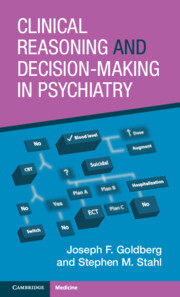Book contents
- Clinical Reasoning and Decision-Making in Psychiatry
- Reviews
- Clinical Reasoning and Decision-Making in Psychiatry
- Copyright page
- Contents
- Foreword
- Preface
- 1 Making Sense of the Senseless: How to Gather and Organize Pertinent Information
- 2 The Approach to Diagnostic Ambiguity
- 3 What the Patient Isn’t Telling You: When Seeing Is Not Believing
- 4 Shared Decision-Making
- 5 Deciding on Appropriate Treatment Modalities: Medication, Psychotherapy, Hospitalization, and Other Levels of Care
- 6 Measurement-Based Care and Applying Statistical Concepts to the Individual Patient
- 7 Hypothesis-Testing and Crafting Patient-Specific Decision Trees
- 8 Decision Points in Iterative Pharmacotherapy
- 9 Hierarchical and Complex Pharmacotherapy Decision-Making
- 10 Prioritizing the Components of Any Decision-Making Model
- Index
- References
2 - The Approach to Diagnostic Ambiguity
Published online by Cambridge University Press: 25 March 2024
- Clinical Reasoning and Decision-Making in Psychiatry
- Reviews
- Clinical Reasoning and Decision-Making in Psychiatry
- Copyright page
- Contents
- Foreword
- Preface
- 1 Making Sense of the Senseless: How to Gather and Organize Pertinent Information
- 2 The Approach to Diagnostic Ambiguity
- 3 What the Patient Isn’t Telling You: When Seeing Is Not Believing
- 4 Shared Decision-Making
- 5 Deciding on Appropriate Treatment Modalities: Medication, Psychotherapy, Hospitalization, and Other Levels of Care
- 6 Measurement-Based Care and Applying Statistical Concepts to the Individual Patient
- 7 Hypothesis-Testing and Crafting Patient-Specific Decision Trees
- 8 Decision Points in Iterative Pharmacotherapy
- 9 Hierarchical and Complex Pharmacotherapy Decision-Making
- 10 Prioritizing the Components of Any Decision-Making Model
- Index
- References
Summary
Clarity about the intended targets of treatment is, by necessity, a prerequisite for any psychiatric or other medical intervention. One cannot make sensible treatment decisions unless one knows with some degree of confidence what exactly constitutes the object of treatment. Yet, by and large, psychiatric diagnoses are made on purely clinical grounds – meaning, they derive from collections of signs and symptoms that cohere in an organized fashion, seldom with definitive corroboration by an external biomarker. (Some exceptions to this might include positive blood or urine toxicology screens to affirm the diagnosis of alcohol or other substance intoxications; low cerebrospinal fluid levels of orexin to diagnose narcolepsy; or neuroimaging or other laboratory tests that affirm an underlying nonpsychiatric medical condition (such as a brain malignancy, or metabolic derangement) that might explain an acute mental status change.) Herein lies a dilemma: while evidence-based treatment means identifying a plausible working diagnosis, categorical diagnoses cannot always be made with the degree of exactitude one might otherwise hope for.
- Type
- Chapter
- Information
- Clinical Reasoning and Decision-Making in Psychiatry , pp. 26 - 51Publisher: Cambridge University PressPrint publication year: 2024

